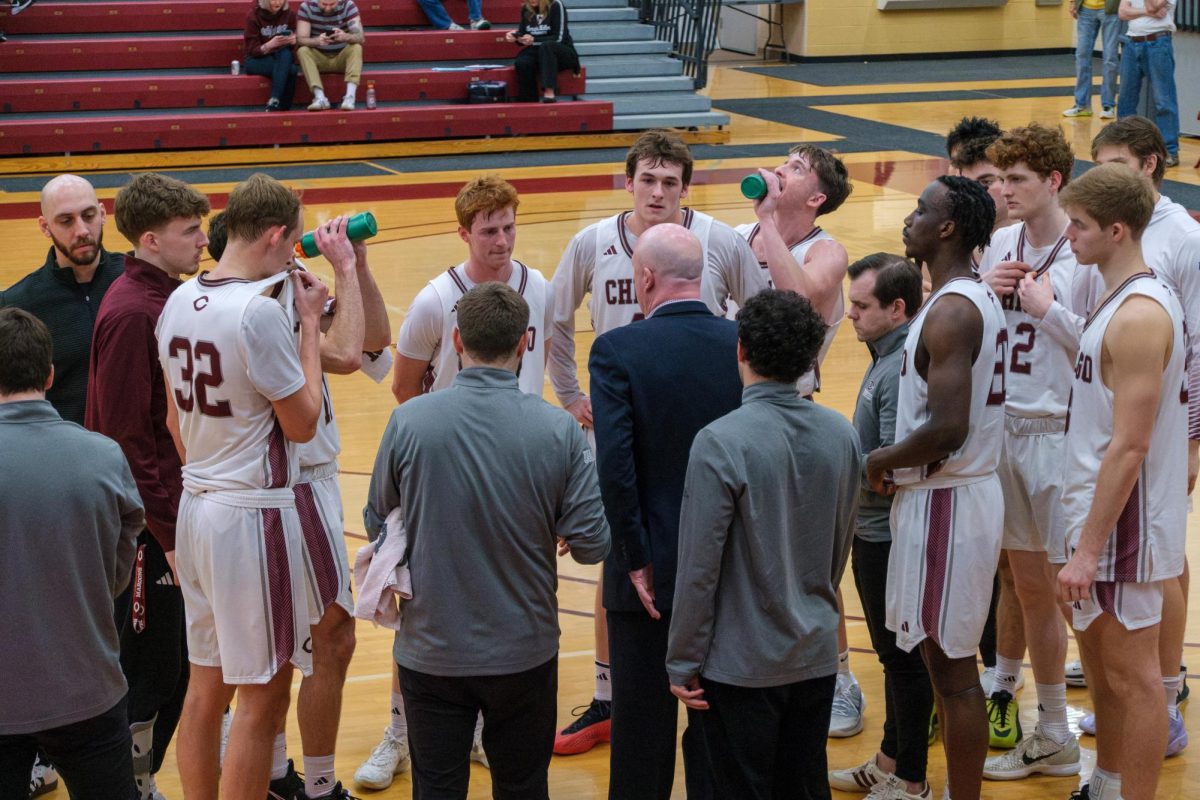[img id=”78486″ align=”alignleft”]
Amid chilling downpours and swirling winds, the sort of weather that usually mutes cheerleaders and banishes mascots to heated clubhouses, the Maroons resoundingly defeated Ohio Wesleyan 30—6, snapping a two-game losing streak and improving to 3—2 on the season.
Abetted by superb defensive and special teams play, the Maroons capitalized early and often on a multiplicity of Ohio Wesleyan turnovers.
The Maroons jumped to a 7—0 lead halfway through the first quarter after second-year Cameron Grimes blocked a punt immediately recovered and run into the end-zone by second-year Alex Dzierbicki.
The Maroons continued to wreak havoc against an Ohio Wesleyan special teams unit that seemed intent upon competing with the weather for the least attractive portion of the day’s events.
The Maroons recovered a fumbled punt early in the second quarter, later extending the lead to 10—0 after a successful 20-yard field goal from first-year Jeff Sauer.
After a three-and-out for the Battling Bishops on the following possession, the Maroons once again blocked punter Brandon Urankar’s attempt, leading to a one-yard rushing touchdown by third-year Francis Adarkwa.
The subsequent possession for the Battling Bishops yielded much the same result: three ineffective downs giving way to a third blocked punt and a scrambling touchdown by first-year quarterback Vincent Cortina, who was making just the second start of his career on Saturday.
“Quite honestly, I determined early on in our preparation that we had a significant schematic advantage against OWU,” said linebacker and special teams coach Daniel Gritti. “The weather actually hurt our special teams. If the surface was less slippery, we would have blocked one if not two more punts.”
The dominant Maroons took a 30—0 lead into halftime.
“We added a few designed quarterback running plays suitable for me and a wildcat offense,” said Cortina, explaining the team’s offensive strategy coming into the game. “The weather was a huge factor in the game planning and execution. The weather completely took away the passing game. It made us rely more on the run, which in the end turned out to be ok.”
Ohio Wesleyan (0—5) struggled offensively throughout the game, proving unable to advance the ball against a stifling Chicago defense. The Maroon wall continuously closed running holes and managed to smother the Battling Bishops’ ground game.
This strength was reflected in the box score; Ohio Wesleyan was forced to pass the ball 20 times, as opposed to the seven passes attempted by the Maroons. This was largely because of the early Maroon lead and a repeated inability to forward the ball on first and second downs.
“We knew what we wanted to accomplish going in, and that was to eliminate the big play element and shut down the run through physical play,” said third-year defensive lineman Jake Longtin, who had 1.5 sacks on the day. “They ran an offense that our type of defense is specifically fine-tuned to shut down….Fortunately, the weather was more detrimental for OWU than it was for us.”
The game’s outcome was clearly determined halfway through the second quarter, signaling an important statement from the Maroons just one week before homecoming. The Maroons had dropped their previous two games by a combined score of 62—34 but improved their home record to 2—0.
Coming off their dominant performance Saturday, the Maroons look ahead to next week’s homecoming against Denison, expecting the return of starting fourth-year quarterback Marshal Oium from injury.
Speaking of expectations moving forward, Coach Gritti explained, “To paraphrase an old commercial: ‘This isn’t your father’s Maroon football.’ Playing well is no longer good enough. We only care about being great and winning championships. Accomplishing anything less is an abject failure on the part of both the coaches and the players.”








